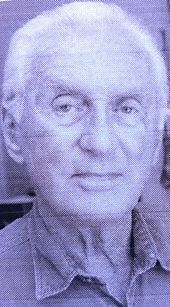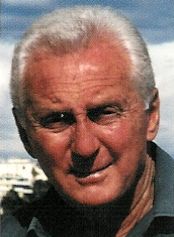View entry
Name: GAVAGHAN, Terence John Frederick MBE


Birth Date: 1 Oct 1922 Allahabad, India
Death Date: 10 Aug 2011 Putney
First Date: 1943
Last Date: 1966
Profession: Public/Development/Disaster - Management Administration. DC to Acting Permanent Secretary, All areas of Kenya + Somalia, Ethiopia, Sudan, Tanzania. Director for Africa, Pfizer International. Project Manager United Nations/ Consultant 1963-92
Area: All over EA
Married: 1. 1948 Cecily May Tofte b. 1927 (div.); 2. 1958 Nicole Caroline Goldstein
Children: Kevin (1949); Sean (1950); David (1959); Sarah (1962)
Author: Of Lions and Dungbeetles, Corridors of Wire
Book Reference: EAWL, Passions, Midday Sun, Saving Game, Cass, Colonial, Staff 53, Wikipedia
War Service: Royal Corps Signals 1942, Cpl. Despatch Rider. R. Ulster Rifles 1942-3 Mortar Pl. Cdr.
School: Stonyhurst College, St. Andrews Univ., Oxford, York Univ. Post Grad. 1970 MPhil (Politics)
General Information:
Obituary in The Times from August 7th 2011 Terence Gavaghan was a colonial civil servant who came to wider notice for his role during the Mau Mau uprising in 1950s Kenya and the subsequent controversy over compensation. Gavaghan was an Irishman born in India. His 18 years as a district officer and district commissioner (the youngest ever appointed) in colonial Kenya included the time of the Mau Mau Emergency. It was his period of 12 months as the officer in charge of rehabilitation at the Mwea detention camps that remains contentious to this day, with Gavaghan being specifically named by one of the Mau Mau claimants currently suing the British Government in the High Court for compensation for ill treatment.
Gavaghan provided two detailed accounts of his experiences at the Mwea. The first was in a volume of autobiography entitled Of Lions and Dung Beetles - or OLAD, as he called it. It covered his time in Kenya, and is remarkable for the detail and richness of his portraits of those he worked with and met: people as varied as Ava Gardner, Elspeth Huxley, Beryl Markham, June Carberry, George and Joy Adamson, Tom Mboya and Jomo Kenyatta. Gavaghan's penchant for keeping records, combined with his formidable memory, makes OLAD a vivid account of distinctive characters and strange events. Every woman's attractiveness and every man's peculiarities are swiftly etched: Gavaghan revelled in the polyglot quirkiness of Kenya's inhabitants, native and colonial, and he deftly recounts marriages, murders and massacres with equal relish.
The second account was Corridors of Wire (COW, inevitably): more detailed but lightly fictionalised, though the characters - ranging from Gavaghan himself (renamed Larry Corrigan) to Barbara Castle - are easily recognisable. "Corrigan" recounts "the warping experience of exercising state authorised power over other human beings". In both OLAD and COW Gavaghan's frankness offered many hostages to fortune, upon which critics of colonial policy, and Mau Mau sympathisers, have been quick to seize.
Gavaghan had been in a hospital bed, recovering from a ruptured Achilles tendon, when Special Commissioner Carruthers "Monkey" Johnston, with the approval of the Governor of Kenya, Sir Evelyn Baring, invited him in March 1957 to take over the process of unblocking the detention system that had been instituted in 1952. At least 80,000 Kikuyu - one third of the adult males in Kenya's largest tribe - had been rounded up in an effort to break the Mau Mau insurgency, which was overwhelmingly a Kikuyu phenomenon.
Tens of thousands had been released, but any further progress towards Kenyan independence was inhibited by the failure of the rehabilitation programme to deal with the last 20,000 detainees, deemed hard-core. Most were held at Manyani, where British authority ruled outside the camp and Mau Mau controlled the inside. Gavaghan, then 35, was seen as a maverick but also as a flamboyant results man. He started at Thiba, one of the Mwea camps, and recruited 200 young loyalist Kikuyu to help to split up the 1,000 detainees there into more manageable groups of 250. Then Gavaghan arranged for batches of detainees from Manyani to be transferred, by train and lorry, to the Mwea. He invited the key ministers in the colonial Government to witness the transfer process and approve it. They did so verbally, and, unbeknown to him, also sought Colonial Office backing for prison regulations to be amended so that "compelling" (but not "punitive") force could be used in these circumstances.
Critics of colonial policy have described this as officially approved brutality. Gavaghan and his colleagues at the Mwea fully understood the critique, but felt that the deteriorating situation in the camps - and the imperative of the political timetable - required exceptional measures, even if these sometimes (as he put it in COW) "skirted the edges of the quasi-legal concept of 'compelling force' ". Once order and control had been restored, Gavaghan set about the process of release. He claimed that his tactic was not to seek renunciation of Mau Mau oaths, but simply acknowledgement of oath taking, so as to enable detainees to go back to their homes to prepare for independence.
Despite predictions of disaster from Gavaghan's predecessor, aghast at the physical methods being used, it appears that there were no deaths and few serious injuries in the 12 months that it took for Gavaghan to clear the camps of all but a few hundred inmates. The last two hundred detainees were transferred to Hola, where 11 were beaten to death the following year by non-Kikuyu warders: a tragedy Gavaghan condemned, and which almost brought down the Conservative Government.
Gavaghan was appointed MBE in 1958, and Baring wrote to him to say how well justified the honour was: "you did an extremely difficult key job admirably". Gavaghan's final postings in Kenya were at Government House itself, rising to acting permanent secretary, where he led the process of Africanising the top 10,000 Civil Service jobs, making sure that former Mau Mau were not excluded. In 1962, a year before Kenya's independence, he was recruited by the United Nations for a mission in Somalia.
Thereafter he spent three decades on humanitarian missions, for 12 UN, Irish and voluntary agencies in 17 developing countries, including Libya, Sudan (he was an expert on Darfur), Ethiopia, Uganda, Afghanistan, Indonesia and Tanzania. He gave clandestine assistance to Zimbabwe's African leaders in the years before independence, and also worked for Texaco and Pfizer International on large projects. But it was the year at the Mwea that shaped how others saw him.
In retirement Gavaghan became a regular performer at the seminars led by John Lonsdale, director of studies in history at Trinity College, Cambridge, on Mau Mau. He rejected accusations of "brute empiricism" made by other speakers. For him the British role in Kenya had been honourable, and consistent with the Devonshire declaration of 1923, which required the colonial government to act above all in the interests of the native peoples they ruled in Kenya.
Gavaghan was born in Allahabad in 1922. His great-grandfather, Patrick, had been a penniless emigrant from Ireland who found work at Hackney railway station. His grandfather, Laurence, had worked on the South India Railways in Madras. His father, Edward, had been orphaned at 5, but the railways and relatives provided a Jesuit education in Sheffield, whence he returned to India as a qualified accountant, eventually becoming Comptroller General in the Indian Civil Service.
Edward's early death in turn led to Terence being educated in England, at a Protestant preparatory school and then by the Jesuits at Stonyhurst College. A Harkness Scholarship to the University of St Andrews was followed by a commission in the Royal Ulster Rifles, which was quickly overtaken by the emergence of a vacancy in the Kenyan administration. Gavaghan took pride equally in his Anglo-Indian roots and Irish origins. He married, first, Cecily Tofte in 1948, fathering two sons. After their divorce he married Nicole Goldstein in 1958: and had a son and a daughter.
